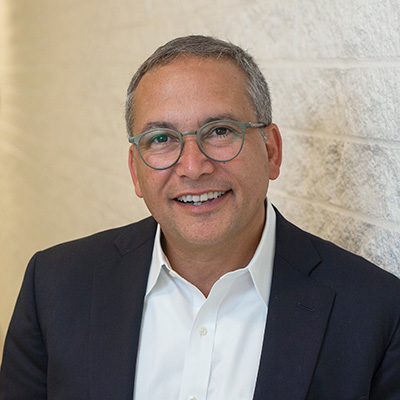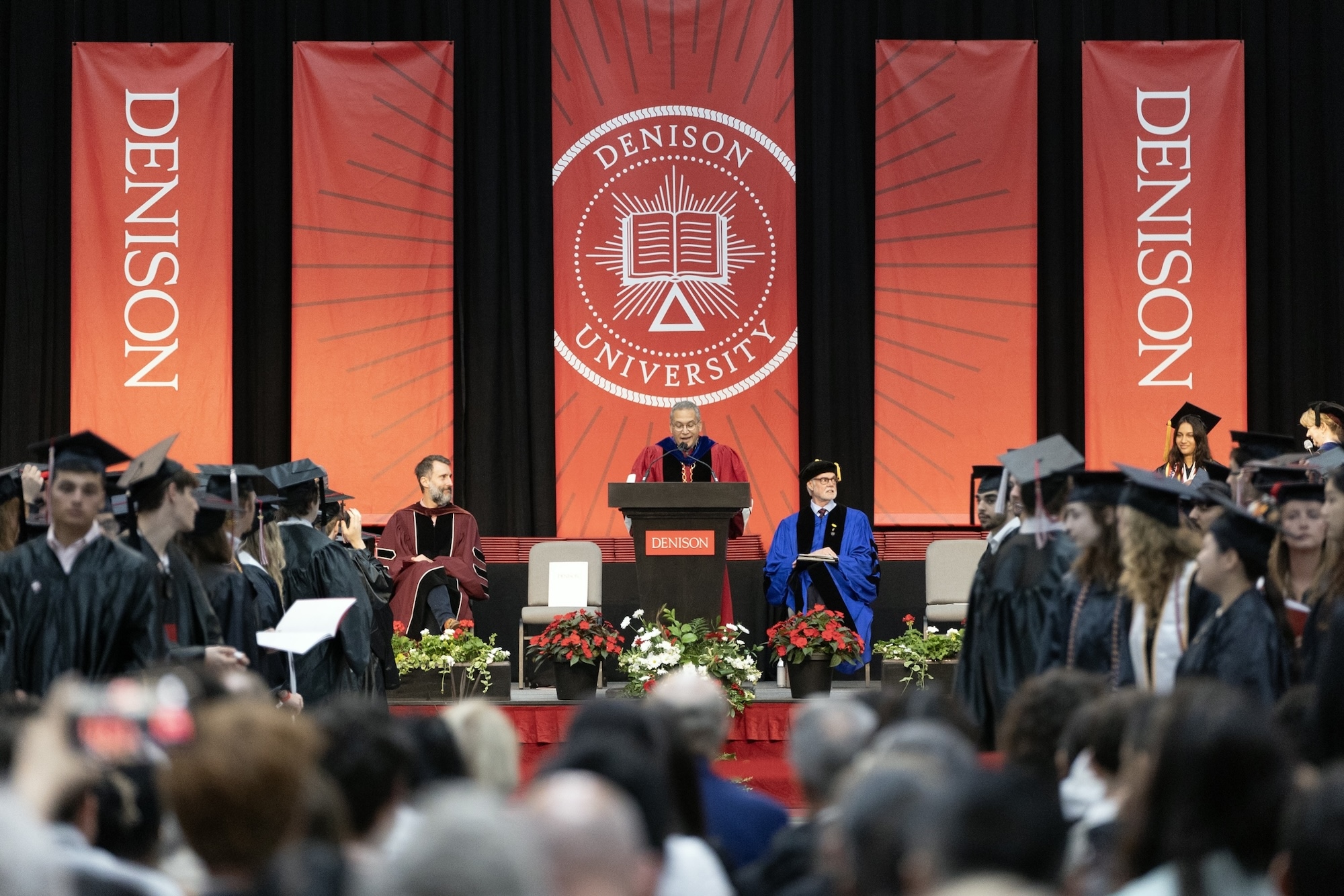Every August, I write a letter to incoming students with advice on how to get the most from your Denison experience. A few weeks ago, a graduating senior asked if I would bookend it with advice on how to “successfully navigate the real world.” As you get ready to graduate from Denison, I want to offer five pieces of advice. Let me start with two pieces of advice that are a bit abstract but important.
The first is to use your liberal arts education to guide your everyday life. You worked hard to get this education; now use it. Walk through life as critical thinkers and creative problem solvers who can effectively communicate and work with others, and be the people who have the intellectual humility needed to navigate complexity. If you do this, you will be a better friend, partner, parent, co-worker, and community member.
There are four skills of the liberal arts that you have learned at Denison.
Critical thinking: Be the people who have the ability to understand problems and issues in their complexity. During your time at Denison, you have learned how to use reason, rationality, and data to better understand the world around you through knowledge and truth.
Creative problem solving: Be the people who have the capacity to innovate. It’s one thing to be able to critique, and it’s another to build on that critique by being able to imagine paths forward and to see beyond old solutions to create the future.
Effective communication: You know how to speak and write in ways that others can hear so you can effectively work together on the things you care about. Anyone can shout, but liberal arts students are taught how to weave words together so that others can understand our points of view. We also know how to listen to and hear the views of others so we can engage and learn from each other.
Intellectual humility: You have developed the capacity to walk through life as a lifelong learner. Liberal arts graduates understand that they might be wrong. Hence, they are the people who are always seeking out alternative views, facts, and experiences. We should always be challenging orthodoxy, starting with our own.
Beneath this set of skills are a set of liberal arts values: a commitment to hard work, ethics, empathy, curiosity, perseverance, humor, and an appreciation that we are part of things that are larger than ourselves.
These skills and values are the gifts we have given you. My first piece of advice is to use them to be the architect of the life you want to live.
Second, develop habits that align with your goals. Denison alum and best-selling author James Clear writes, “What we repeatedly do, each and every day, ultimately forms the results we enjoy and the goals we achieve. Change your habits, change your systems, and you’ll transform your life, team, and organization.”
Whatever goals you want to hit in your life will only be achieved when your habits align with them. Clear writes, “Habits are the small decisions you make and actions you perform every day. Habits account for about 40% of our behaviors on any given day. Your life today is essentially the sum of your habits. What you repeatedly do (i.e., what you spend time thinking about and doing each day) ultimately forms the person you are, the things you believe, and the personality that you portray.”
Clear often writes that we do not rise to the level of our goals, but rather, we tend to fall to the level of our habits. Our ability to be happy, successful, healthy, and productive is all shaped by the habits we have or don’t have. Your habits need to be aligned with your goals for the kind of life you want to lead.
I suspect all of us can name three good habits we have and three bad habits we would like to change. We have the agency to preserve the habits we like and to change those that are not helpful to us. A piece of advice - read Clear’s Atomic Habits as your first post-college book.
Now, let me offer three pieces of advice that are practical and equally important.
Third, develop healthy relationships. If you get the relationships in your life right, everything else will fall into place. Here is a truism — your life will be remarkably similar to the people you surround yourself with. Develop relationships with people who bring out the best in you. Shed toxic people. Surround yourself with people who are curious, grateful, and positive.
You have just spent four years on a campus that is defined by relationships. Hopefully, one of the things you learned at Denison is what a healthy relationship does and does not look like. One of our graduating seniors recently wrote to me:
“The people at Denison make it a special place. The professor in my first year who remembered me because of my hometown and invited me a year later to do summer research. The staff in places who make a deep investment and have a profound impact on the students. My Denison friends have made me a more well-rounded thinker, ready to hold space for difficult conversations. Call it the Midwest charm, but Denison students are some of the most welcoming, inclusive people who make you feel at home.”
Many of you leave Denison with incredible friendships. Nurture these friendships so they can shape your life. An alum recently wrote to me, “To this day, I remain extremely close with approximately 15 of my Denison friends, and over the last 30 years, that has extended to their wives and children. Forty years post-graduation, we gather three to five times a year. Not a single day goes by without our text chat. We have lived life with joys, challenges, and really hard times, and we have done it together. Always supportive, I have known at every moment of my life I was not alone, and my Denison friends were there and with and for me. You can’t choose your family, but you get to choose your friends. At Denison, we chose each other, and with each passing day, the bonds have strengthened. I cannot conceive of life without them.”
Fourth, be present in every moment and be performance-oriented. If I could give you one parting gift, it would be this one. Don’t be distracted by the past or worried about the future. If you stay focused on the past, you will live a life of regret or nostalgia. If you stay focused on the future, you will live life focused on things that never happened. Stay focused on the present moment. Devote all your time and attention to what is right in front of you. And focus all your time and attention on enjoying that moment, learning from that moment, and performing at the highest level in that moment towards whatever you are trying to achieve.
Doing this requires being centered and staying centered. Find what centers you and your own form of mindfulness. As many of you know, I have a serious meditation practice that allows me to stay focused on what is right in front of me, even when my job and other aspects of my life can pull me in different directions. Find your own form of mindfulness. Hike, cook, journal, read. There is no right way, but notice we are back to habits. Finding your way and making it a habit matters.
As part of this, avoid two mental mistakes that too many people make. The first is being fixated on failure. We all experience failure. Learn from it, use it to grow as a person, and then move on. But don’t ever stay fixated on it. The second is our fear of embarrassment, which too often keeps people from trying the things they most want to try. Here is a simple truth: life gets much easier when you get over your fear of embarrassment.
Show up, stay focused on the present moment, work hard, and perform well. If you do this, you will be surprised at how far you will get towards your goals and aspirations.
Fifth, careers only look linear backward; find a place to start and take it one step at a time. I am often asked by students, what is the best first job? The answer is simple: the best first job is the one you can get. Your first job is merely your first job. Find someplace to start and take it from there. My first three jobs were a disaster, but I learned from them, and my fourth got me on a path that I did not anticipate when I graduated from college that has shaped my life.
In this economy, your second job may be your most important one. The first pivot matters, and remember the Knowlton Center will be here for you as you make it. But your first job is a place to start, learn, and grow from.
At a recent Denison alumni event, somebody said to me that they always advise recent college graduates to ask themselves three questions about any job: Do I like the people I work for and with? Am I gaining skills and experiences that open up new opportunities and make me worth more on the open market than I was a year ago? And am I paid a reasonable amount for the work that I am doing? That’s good advice. I would add, does this job allow me to architect the life that I want for myself?
Everything is a step towards something. Your career will unfold in unexpected and good ways. One fun piece of advice — make it a habit to ask people at work to share their career journeys with you. People like to talk about themselves. They will be happy to share. You will learn a lot.
That is my advice: You get to be the architect of the life you want to live. Do so by using the Denison education you worked hard to receive. Develop good habits and nurture healthy relationships, starting with those you made at Denison. Be present in every moment and be performance-oriented. Find a job, and don’t worry if it is not the perfect job; it won’t be. Finally, stay curious, grateful, and positive.
One last quote from a graduating senior: “I came to Denison with very tentative ideas of who I was and what I wanted my future to be. Looking back at my time at Denison, it has been through my relationships that I have learned more about who I am and what sets my soul on fire. I have received a lot of praise recently for my accomplishments at Denison, and while I appreciate the recognition for my hard work, I believe so much of the recognition also deserves to go to my friends, teammates, mentors, and coaches who have offered support while challenging the limits I set on myself. Through these relationships, I feel I have grown to know myself better. I am indebted to Denison for creating the physical space where I have cultivated some of the most influential and fulfilling relationships of my life. I am indebted to the people I have built relationships with for making these past four years some of the most transformational years of my life and making it so hard to leave.”
I want to end with a request — stay connected and committed to this college. Come back for your reunions. Put a Denison coffee mug on your desk at work, a bumper sticker on your car, and a Denison pennant on your refrigerator at home. You are great people, and we want the world to know you are Denisonians. Identify yourself so other members of our extended family can do the same.
Congratulations, Denison Class of 2024.







